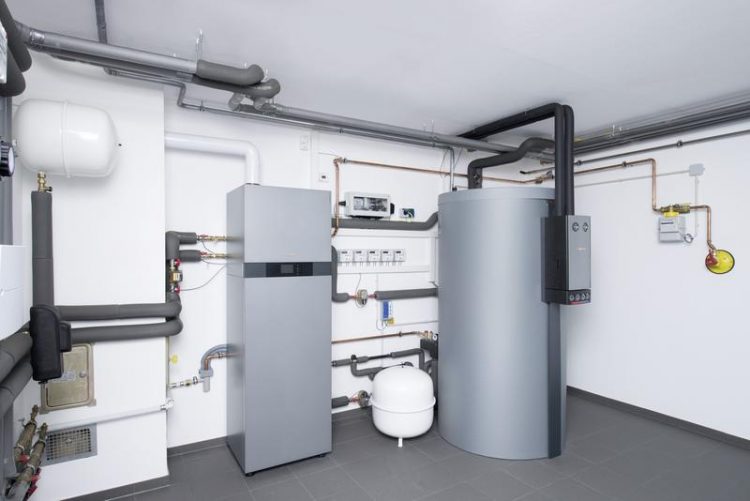Heating residential buildings with thermal heat pumps

Gas-powered adsorption heating device combines condensing boiler technology with a heat pump module. © Viessmann Werke GmbH & Co. KG
For a long time, thermal heat pumps were generally considered too large to cover the relatively low heating requirements of single- and multi-family homes efficiently. Newly developed gas adsorption heating devices can now change that.
They have been developed specifically for this application. The BINE-Projektinfo brochure “Heating with gas adsorption heat pumps“ (03/2015) presents one of the new devices. This combines condensing boiler technology with a zeolite/water-based thermal heat pump module.
The device consists of two modules: the thermal heat pump module covers the base load for the building heating. The necessary drive heat is provided by a gas condensing module. This also covers the peak heating requirement on very cold days.
Compared with an electric heat pump, the new concept requires significantly less environmental heat. Borehole heat exchangers, ground collectors and geothermal baskets as well as solar thermal energy can be used as heat sources. An up to 40% greater annual utilisation rate can be achieved relative to pure gas condensing boilers.
The gas-adsorption heating device has been developed by the Viessmann company from Allendorf, Germany. In the subsequent field tests, plant operators and heating installers confirmed their excellent experience with the devices. The operators particularly highlighted the low noise emissions and intuitive operation. The effort required for the installation and commissioning is no greater than for conventional heating systems.
The BINE-Projektinfo brochure The BINE-Projektinfo brochure “Heating with gas adsorption heat pumps“ (03/2015) follow this link:
http://www.bine.info/en/press/press-releases/press/pressemitteilung/mit-thermisc…
Press contact
Uwe Milles
presse(at)bine.info
About BINE Information Service
Energy research for practical applications
The BINE Information Service reports on energy research topics, such as new materials, systems and components, as well as innovative concepts and methods. The knowledge gained is incorporated into the implementation of new technologies in practice, because first-rate information provides a basis for pioneering decisions, whether in the planning of energy-optimised buildings, increasing the efficiency of industrial processes, or integrating renewable energy sources into existing systems.
About FIZ Karlsruhe
FIZ Karlsruhe – Leibniz Institute for Information Infrastructure is a not-for-profit organization with the public mission to make sci-tech information from all over the world publicly available and to provide related services in order to support the national and international transfer of knowledge and the promotion of innovation.
Our business areas:
• STN International – the world’s leading online service for research and patent information in science and technology
• KnowEsis – innovative eScience solutions to support the process of research in all its stages, and throughout all scientific disciplines
• Databases and Information Services – Databases and science portals in mathematics, computer science, crystallography, chemistry, and energy technology
FIZ Karlsruhe is a member of the Leibniz Association (WGL) which consists of 87 German research and infrastructure institutions.
http://www.bine.info/en – BINE-Informationsdienst
Media Contact
All latest news from the category: Architecture and Construction
Newest articles

Innovative 3D printed scaffolds offer new hope for bone healing
Researchers at the Institute for Bioengineering of Catalonia have developed novel 3D printed PLA-CaP scaffolds that promote blood vessel formation, ensuring better healing and regeneration of bone tissue. Bone is…

The surprising role of gut infection in Alzheimer’s disease
ASU- and Banner Alzheimer’s Institute-led study implicates link between a common virus and the disease, which travels from the gut to the brain and may be a target for antiviral…

Molecular gardening: New enzymes discovered for protein modification pruning
How deubiquitinases USP53 and USP54 cleave long polyubiquitin chains and how the former is linked to liver disease in children. Deubiquitinases (DUBs) are enzymes used by cells to trim protein…



